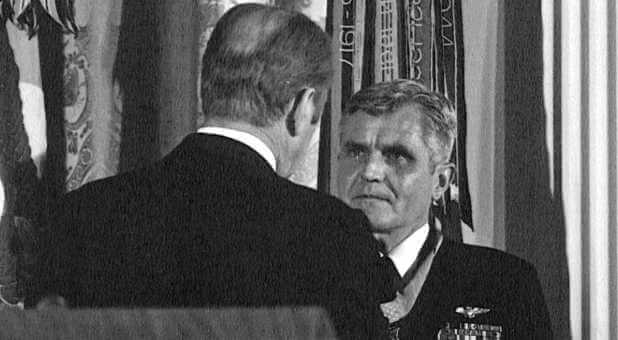Vice Admiral James B. Stockdale was an officer in the US Navy during the Vietnam War. He became a fighter pilot, and in 1965, he was shot down while returning from his second combat tour over North Vietnam. Held for nearly eight years as a prisoner-of-war in the infamous “Hanoi Hilton,” he suffered repeated torture and years in solitary confinement without any prisoner’s rights and with no assurance that he would survive the war or live to see his family again.[1]
As the highest-ranking officer in the camp, Stockdale shouldered responsibility for the other men also held there. He made it his mission to do everything in his power to help the men survive unbroken while at the same time leading the American resistance against Vietnamese attempts to use the prisoners for propaganda. He instituted a cohesive set of rules governing prisoner behavior that provided the men with hope and empowerment. He developed an elaborate method of internal communication the men could use even during enforced silence or solitary confinement. Risking further torture or death if discovered, he found ways to forward secret intelligence to the U.S. government through letters he was allowed to write to his wife. Following his release, he received a total of 26 medals, including the Medal of Honor.
Could you survive that kind of trauma? What kept Admiral Stockdale sane during those years of imprisonment and torture? What allowed him to do so much to help so many other men survive unbroken?
The Stockdale Paradox
Researcher and author Jim Collins writes of an enlightening conversation he had with Stockdale. When asked how he made it through, Stockdale responded;
“I never lost faith in the end of the story. … I never doubted not only that I would get out, but also that I would prevail in the end and turn the experience into the defining event of my life, which, in retrospect, I would not trade.”[2]
But not everyone made it through intact. Who didn’t survive? The optimists.
“They were the ones who said, ‘We’re going to be out by Christmas.’ And Christmas would come, and Christmas would go. Then they’d say, ‘We’re going to be out by Easter.’ And Easter would come, and Easter would go. And then Thanksgiving, and then it would be Christmas again. And they died of a broken heart.”
And then Stockdale told Jim Collins the bottom line.
“This is a very important lesson. You must never confuse faith that you will prevail in the end—which you can never afford to lose—with the discipline to confront the most brutal facts of your current reality, whatever they might be.”
That lesson has become known as the Stockdale paradox;
“Retain faith that you will prevail in the end regardless of the difficulties, and at the same time, confront the most brutal facts of your current reality, whatever they may be.”
Your Stockdale Paradox
You and I are also in a war. No, we’re not flying fighter jets over North Vietnam. We’re not chained with leg irons or held in solitary confinement. We don’t have to communicate with our superiors through secret codes hidden in written letters. But we are in a war nonetheless.
If you’ve made a decision to follow Jesus and taken your stand on God’s side, then you have an enemy. That enemy is not your boss, your children or your spouse. Your enemy is God’s enemy: Satan and his kingdom of darkness. And he is out to destroy us with more tenacity than any North Vietnamese army fighting against the U.S. forces.
Your problems are in some measure part of the war between good and evil, God and Satan. Your problems may simply be keeping you from being as effective for God’s kingdom as you need to be, or they may come more directly from Satan’s opposition.
Regardless, your pathway out and to freedom is the Stockdale paradox—looking with brutal honesty at the factors involved in your distress, including spiritual warfare, while at the same time maintaining absolute faith in the freedom and victory Jesus makes available to you.
During his captivity, Admiral Stockdale did not spend his energy blaming U.S. government policy for their ineffective execution of the war, as ineffective as those policies were. He didn’t rail against his captors for their brutality or wallow in self-pity. He focused his energy on surviving, resisting and helping others.
You too must focus your energy not on blaming others or wallowing in self-pity, but on surviving, resisting and then helping others.
The Two Action Steps
Those two ingredients of the Stockdale paradox provide an awesome road map forward whatever your problems may be: physical illness, psychological distress, financial trouble, relationship problems or spiritual oppression.
And usually any of those problems is also affected by your well-being in all the other areas.
Here’s how to turn those two ingredients into action steps to deal with any problem you have.
1. Confront the brutal facts of your situation.
Faith does not refuse to be honest. Faith confronts the truth, but faith also knows that what our physical senses see is only part of the truth.
















































